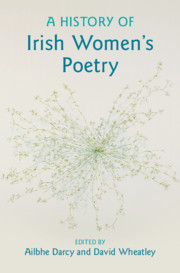Book contents
- A History of Irish Women’s Poetry
- A History of Irish Women’s Poetry
- Copyright page
- Contents
- Notes on Contributors
- Acknowledgements
- Introduction I
- Introduction II
- Chapter 1 Women in the Medieval Poetry Business
- Chapter 2 Seventeenth-Century Women’s Poetry in Ireland
- Chapter 3 The Oral Tradition
- Chapter 4 Archipelagic Ireland
- Chapter 5 Irish Romanticism
- Chapter 6 Mary Tighe in Life, Myth, and Literary Vicissitude
- Chapter 7 Masculinity, Nationhood, and the Irish Woman Poet, 1860–1922
- Chapter 8 The Eclipse of Dora Sigerson
- Chapter 9 Between Revivalist Lyric and Irish Modernism
- Chapter 10 The Other ‘Northern Renaissance’
- Chapter 11 Rematriating Mid-Century Modernism
- Chapter 12 Accidental Irishness and the Transnational Legacy of Lola Ridge
- Chapter 13 Crisis and Renewal: Irish-Language Poetry in the Twentieth and Twenty-First Centuries
- Chapter 14 The Poetry of Máire Mhac an tSaoi and the Indivisibility of Love
- Chapter 15 Biddy Jenkinson
- Chapter 16 Bilingual Poetry
- Chapter 17 Catholicism in Modern Irish Women’s Poetry
- Chapter 18 1970s–80s Feminism
- Chapter 19 The Art of Fabrication
- Chapter 20 Eavan Boland, History and Silence
- Chapter 21 Paula Meehan and the Public Poem
- Chapter 22 Formalism and Contemporary Women’s Poetry
- Chapter 23 ‘A Song Said Otherwise’
- Chapter 24 Contemporary Irish Women’s Poetry, beyond the Now
- Select Bibliography
- Index
Chapter 7 - Masculinity, Nationhood, and the Irish Woman Poet, 1860–1922
Published online by Cambridge University Press: 11 June 2021
- A History of Irish Women’s Poetry
- A History of Irish Women’s Poetry
- Copyright page
- Contents
- Notes on Contributors
- Acknowledgements
- Introduction I
- Introduction II
- Chapter 1 Women in the Medieval Poetry Business
- Chapter 2 Seventeenth-Century Women’s Poetry in Ireland
- Chapter 3 The Oral Tradition
- Chapter 4 Archipelagic Ireland
- Chapter 5 Irish Romanticism
- Chapter 6 Mary Tighe in Life, Myth, and Literary Vicissitude
- Chapter 7 Masculinity, Nationhood, and the Irish Woman Poet, 1860–1922
- Chapter 8 The Eclipse of Dora Sigerson
- Chapter 9 Between Revivalist Lyric and Irish Modernism
- Chapter 10 The Other ‘Northern Renaissance’
- Chapter 11 Rematriating Mid-Century Modernism
- Chapter 12 Accidental Irishness and the Transnational Legacy of Lola Ridge
- Chapter 13 Crisis and Renewal: Irish-Language Poetry in the Twentieth and Twenty-First Centuries
- Chapter 14 The Poetry of Máire Mhac an tSaoi and the Indivisibility of Love
- Chapter 15 Biddy Jenkinson
- Chapter 16 Bilingual Poetry
- Chapter 17 Catholicism in Modern Irish Women’s Poetry
- Chapter 18 1970s–80s Feminism
- Chapter 19 The Art of Fabrication
- Chapter 20 Eavan Boland, History and Silence
- Chapter 21 Paula Meehan and the Public Poem
- Chapter 22 Formalism and Contemporary Women’s Poetry
- Chapter 23 ‘A Song Said Otherwise’
- Chapter 24 Contemporary Irish Women’s Poetry, beyond the Now
- Select Bibliography
- Index
Summary
Given the gender segregation of the times, Irish women poets in the decades between the Famine and the revolutionary period often wrote about events they had witnessed but not participated in at first hand. Nowhere is this gap more noticeable than in representations of conflict and the valorous male warriors who waged it. In the mid-nineteenth century the poets of the Nation, including Francesca Elgee (‘Speranza’) employed ballad forms to orient women’s poetry firmly towards nationalist self-assertion. In Revivalist times Katharine Tynan wrote sensitively of Anglo-Irish relations, and of soldiers’ lives in the First World War, a conflict in which two of her sons served. Martyred Irish manhood is a classic nationalist trope, but acquires wider resonances when applied to First World War elegies too. The neglected work of Winifred Letts is also considered, helping to build a larger picture of the connections between Irish and English traditions at a time of conflict and transition.
- Type
- Chapter
- Information
- A History of Irish Women's Poetry , pp. 142 - 157Publisher: Cambridge University PressPrint publication year: 2021

